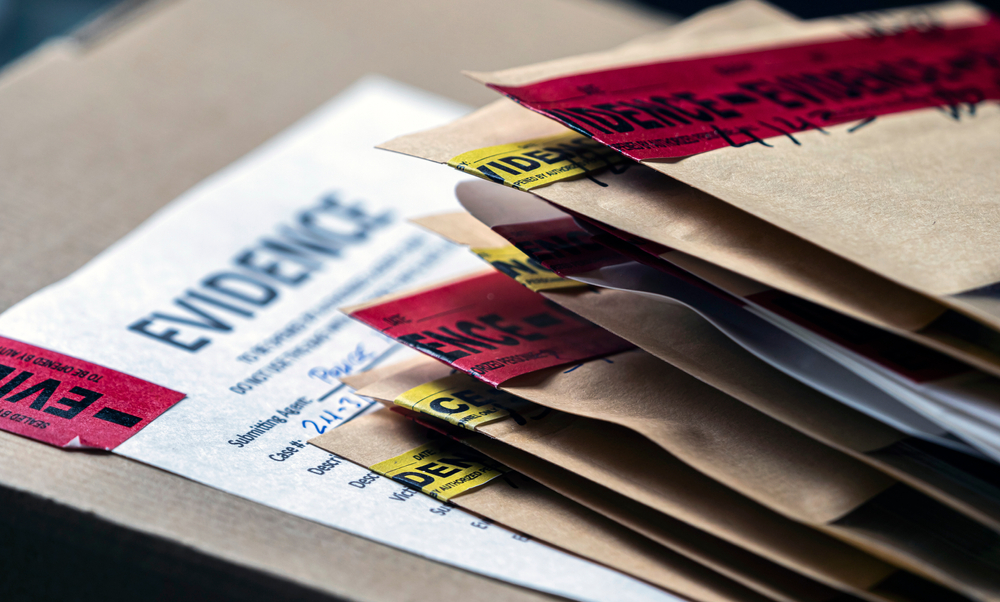Types of Evidence Presented in a Criminal Defense Case
July 17, 2022

A defendant is innocent until proven guilty in a court of law. The prosecutor is tasked with proving beyond a reasonable doubt that the defendant is guilty of charges. New Jersey courts recognize the following types of evidence that are commonly included as part of criminal defense cases:
1. Real Evidence
Real evidence includes anything present at the scene of the crime. It includes material evidence that you can physically hold. This may include things like:
- Weapons
- Fingerprints
- Personal belongings
- DNA
The prosecutor may hold up and display these pieces of evidence in court. It may also be handed to the judge or jury to hold and review more closely.
2. Documentary Evidence
Documentary evidence includes documents that prove guilt. In some cases, documentary evidence may be presented as real evidence. A few examples of documentary evidence may include:
- Living will
- Property lease
- Signed contract
- Ransom note
This type of evidence typically provides the judge or jury with additional evidence. These documents may be used to support real evidence already introduced in the case. Documentary evidence may also include digital evidence if any of the documents come from a computer or mobile phone.
3. Testimonial Evidence
Testimonial evidence is a witness statement. This may include:
- A witness at the scene of the crime
- A witness who identified that the defendant fled the crime
- A close family member or friend
- An alibi of the defendant
Testimonial evidence is sometimes referred to as direct evidence or prima facie evidence. The witness must give their statement under oath to qualify as testimonial evidence.
4. Demonstrative Evidence
Demonstrative evidence is any evidence that the prosecutor provides to back up their claims that the defendant has committed a crime. A few examples of demonstrative evidence may include:
- A map of the crime scene
- A layout of the crime scene
- Charts that demonstrate consequences
- A graph that shows the physical damages
Demonstrative evidence is often used to prove the consequences of the crime. It may be used to demonstrate the physical or emotional consequences the victim experienced as a result.
Are You Being Charged With a Crime in New Jersey?
A criminal trial requires sufficient evidence to prove that the defendant is guilty beyond a reasonable doubt. If you’re being charged with criminal charges in New Jersey, it’s important that you consider your legal defense options as soon as possible. Criminal charges in New Jersey can lead to expensive fines, jail time, and a permanent criminal record.
You need a criminal defense lawyer who works just as hard as the prosecutor to build your defense. This includes collecting many of the same pieces of evidence that, instead of proving your guilt, show your innocence. Real evidence, documentary evidence, testimonial evidence, and demonstrative evidence can all prove your innocence, especially if this evidence points to someone else being responsible.
Without sufficient evidence, the prosecutor shouldn’t be able to prosecute fully. You need a lawyer that will build your defense and work toward a plea agreement that may lead to reduced charges.
Read more: Can I Travel Out Of State While On Probation?
Contact an Experienced Marlton Criminal Defense Lawyer About Your Criminal Charges in New Jersey
Were you arrested or charged with a crime in New Jersey? The consequences of a conviction could be severe, leaving you with a permanent criminal record and possibly even sending you to jail. That is why you need to speak with a qualified criminal defense attorney as soon as possible about your case. The Law Office of John B. Brennan has successfully represented clients charged with a crime in Marlton, Cherry Hill, Pemberton, Medford, and throughout New Jersey. Call (856) 446-5123 or fill out the online contact form to schedule a consultation with a member of our legal team. We have an office conveniently located at 10000 Lincoln Dr. East, Suite 201, Marlton, NJ 08053.
The articles on this blog are for informative purposes only and are no substitute for legal advice or an attorney-client relationship. If you are seeking legal advice, please contact our law firm directly.
Disorderly conduct consists of any improper behavior such as fighting, threats of violence, or creating a dangerous atmosphere.
